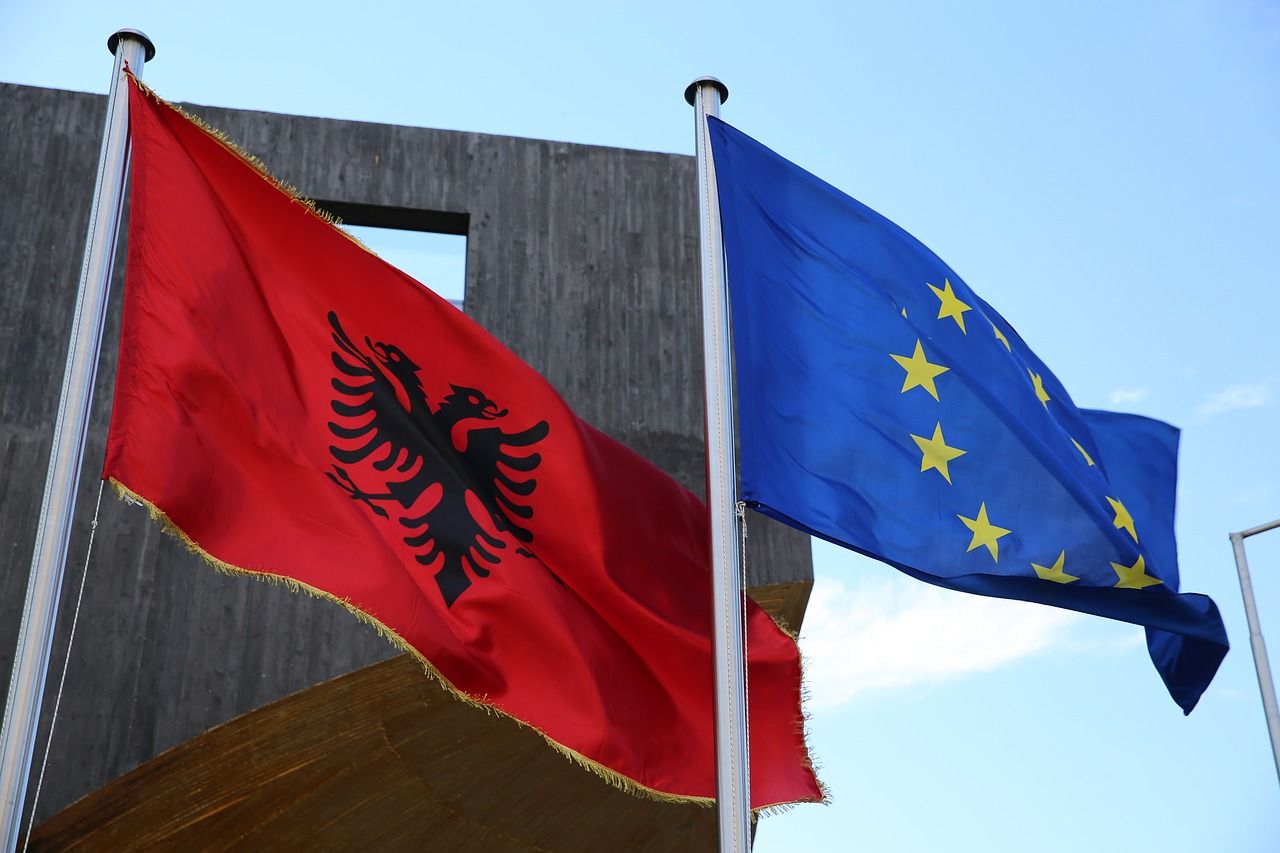Slowing Down EU Enlargement to the Balkans

State of Play
The reason why the European Council has not yet set the date for the start of accession talks with Albania and North Macedonia, even though they have already met the conditions set by the European Commission, has been France’s opposition to the process. In Albania’s case, Denmark and the Netherlands also object. At the same time, France has declared its support for EU enlargement to the Balkans, provided that the methodology for accession negotiations is changed to strengthen the effectiveness of rule-of-law reform in candidate countries. It is also trying to show that it is not blocking integration progress in the Balkans and indicates that the other Member States are divided in their opinions on whether the decision to start the negotiations should apply to both countries or separately.
The French proposal to reform the accession process, drafted in the non-paper, is based on four principles. The first, “gradual accession” implies the division of the 35 negotiation chapters into seven blocks, negotiated and concluded one by one, with the exception of chapters 23 and 24 on the rule of law, which would remain open throughout the negotiations. The second, “stringent conditions” would define criteria for moving on to the next stage, which would result in the granting of benefits under the third principle, “tangible benefits” (access to EU programmes and instruments). The fourth principle, “reversibility”, would allow the EU to return to a closed stage if they find out the criteria were no longer met, which would result in the withdrawal of benefits associated with the closure of the related block.
Consequences for North Macedonia and Albania
France’s position has had direct consequences for North Macedonia, whose government promised the public that the change in the name of the country would result in accession to NATO and in starting accession talks with the Union. The ratification of a membership agreement with the Alliance is ongoing in NATO member states, but the lack of progress in rapprochement with the EU has deprived the cabinet of Social Democrat Zoran Zaev of credibility and prompted him to step down. Euro-Atlantic integration was the main argument of the “for” side in the referendum held last September (which asked voters: “Are you in favour of EU and NATO membership by accepting the agreement between the Republic of Macedonia and the Republic of Greece?”), regarding the adoption of the Prespa agreement of June 2018. Its central point was the country’s change of name, which, entered into force in February 2019. The results have been questioned by the opposition even though 94% of those voting in the referendum were “for” it and only less than 6% “against” it because the turnout was less than 37%, with most opponents of the agreement boycotting the vote.
Early elections, scheduled for 12 April 2020, carry the risk of re-opening the debate on the agreement with Greece. Some politicians of the main opposition force, including the conservative Internal Macedonian Revolutionary Organization—Democratic Party of Macedonian National Unity (VMRO–DPMNE), are calling for re-negotiation. During this party’s former leader Nikola Gruevski’s time in power in 2006-2016, Macedonia left the path of EuroAtlantic integration and had serious problems with democracy, including widespread corruption, nepotism, limited media freedom, and improper influence in election results and court judgments. The deficiencies were so numerous that in 2016 the European Commission proclaimed Macedonia to be in a mode of “state capture”. After Gruevski was convicted of related charges in 2018, he fled the country with the Hungarian government’s help to Budapest, where he was granted asylum. Back in North Macedonia, VMRO–DPMNE leads in pre-election polls.
Regarding Albania, the opposition to starting accession negotiations did not cause the government to collapse. This is because the decision concerning Albania was less surprising since some Member States had already pointed out the country’s lack of preparations for membership talks. France was one, but also there were others, for example, the Netherlands, whose parliament concluded this spring that it would be premature for the June European Council to indicate a date for opening the negotiations with Albania. In turn, Germany’s parliament agreed to set a date but conditioned the start of negotiations on further reform of the rule of law. In light of these doubts and the lack of a decision to open talks with either Balkan country, decoupling is the main risk for Albania, because if starting negotiations is considered separate from North Macedonia, that may further delay its integration progress.
Risk for EU Activities in the Balkans
France’s opposition increases the risk for other EU initiatives in the Balkans. European integration has been used not only to motivate countries in the region to reform but also to normalise relations, such as the Serbia-Kosovo dialogue. These difficult relations are also covered by the negotiation chapter in Serbia’s talks on EU membership. In Kosovo, rapprochement with the EU has been used to strengthen the rights of the Serbian community and restrain the ambitions to build a confederation with Albania. In Bosnia and Herzegovina, European integration has served as an incentive to pass competences to the central state level from the country’s constituent parts and mitigate occasional separatist aspirations, particularly those of Republika Srpska, or calls for the creation of a separate part with a Croatian majority. At the same time, the prospect of membership served to maintain the pro-Western orientation of the Balkan countries facing increasing pressure from Russia, which attempts to frustrate integration processes in the region. From this perspective, France’s actions benefit Russia.
Conclusions
France has blocked EU enlargement to the Balkans, although it indicates that it supports expansion under stricter conditions. Although France invokes the need for credibility and accountability in EU policy, its prevention of the opening of accession negotiations with Albania and North Macedonia—despite them meeting the Commission’s conditions—contradicts both of these values.
Undermining EU enlargement policy, which is based on Member States’ consent to move to the next stages of integration after meeting declared conditions, is particularly harmful to the society and government of North Macedonia in particular. The price for the integration progress promised by the Union was the change of the country’s name, an especially dear cost from a national identity vantage point. The demand to renegotiate the Prespa agreement will be an important part of the opposition VMRO-DPMNE’s election campaign, but the probability of renegotiation is low because it could mean the return of Greece’s block on European integration with North Macedonia. However, if its demands boost the party in the election, this may translate into its return to power, which in the past has distanced the country from democratic standards and membership in both the EU and NATO.
France’s decision has revealed a disregard for the position of most Member States, including those of the Visegrad Group (V4). During the first meeting of the group’s prime ministers in the “V4+Western Balkans” format in September, the Visegrad countries adopted a joint statement in which they directly pointed to a link between maintaining credible enlargement policy and the Union’s security, stability and prosperity. At the same time, France’s position runs counter to the assumptions of the Berlin Process, in which the country participates, and also to the 2018 EU strategy towards the Balkans.
France’s non-paper proposals are a signal for a debate about a correction in enlargement policy, with the possible intention to condition it by the consent of Member States—including Germany—to reform the EU. In fact, the document does not demand fundamental changes to the negotiation process. This is because the chapters on the rule of law are already opened first and the others are opened gradually. They are provisionally closed, which means they can be reopened. Areas requiring smaller reforms are negotiated first and a somewhat similar assumption seemed to be guided by the French proposal.
Delaying the negotiation progress with Albania and North Macedonia also goes against Poland’s strategic goal in the Balkans. Poland has invested in accelerating the integration of these countries, including through bilateral means such as the Skopje Conference (held since 2010) or the Tirana Conference (since 2018). France’s actions undermine the effectiveness of these instruments. Poland’s condition for consent to changes in enlargement policy should be the fulfilment of existing EU commitments because, without that, the formulation of additional accession conditions will not be credible. Also, there is no reason why the discussion about a correction in the approach to enlargement cannot take place after inviting both countries to the membership talks.


